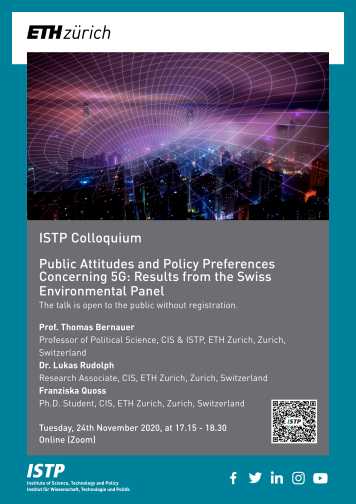Colloquium: Prof. Thomas Bernauer, Dr. Lukas Rudolph & Franziska Quoss
Tuesday, 24th November 2020, at 17.15 - 18.30
Online (Zoom): To receive the Zoom Meeting link, please subscribe to our .
Public Attitudes and Policy Preferences Concerning 5G: Results from the Swiss Environmental Panel

5G is the fifth generation technology standard for broadband cellular networks. The predominant view amongst experts is that introducing 5G will be very beneficial for consumers, firms, and society more broadly. However, it remains controversial whether 5G creates additional health risks and whether current government policies in this area are adequate. The fifth wave of the Swiss Environmental Panel, which includes a representative sample of around 9’000 Swiss citizens, focuses on 5G; we will present the first results from this panel wave. We will first look at how strong concern over 5G related risks actually is and what drives such concern. We also discuss results from vignette and choice experiments that shed light on whether there is a NIMBY (not in my backyard) effect, in the sense that consumer/citizen concern or acceptance of 5G is contingent on the location of 5G antennas, and on what policies citizens prefer with respect to 5G.
Prof. Thomas Bernauer
Thomas Bernauer is a professor of political science at ETH Zurich. He and his research group are based at the Center for Comparative and International Studies (CIS), a joint institution of ETH Zurich and the University of Zurich, as well as ETH Zurich’s Institute of Science, Technology and Policy (ISTP). In 1995, he was appointed assistant professor at ETH Zurich, in 1999 associate professor, and in 2004 full professor. In 2004-2006 Thomas Bernauer was dean of ETH Zurich’s department of social sciences and humanities, and in 2005-2009 director of the Center for Comparative and International Studies. Since 2015, he is the director of ETH’s Institute of Science, Technology and Policy, ISTP. In his research and teaching, Thomas Bernauer focuses on international environmental and economic issues. He is the author or co-author of ten books and more than 120 journal articles and book chapters.
Find out more about the speaker
Dr. Lukas Rudolph
Since 2020, he is Senior Research Fellow (Akademischer Rat) at the external page Geschwister Scholl Institute of Political Science of LMU Munich and Research Associate at the Center for Comparative and International Studies of ETH Zurich. From 2017 to 2019, he was Postdoctoral Researcher at the Center for Comparative and International Studies and the Institute of Science, Technology and Policy of ETH Zurich. His research covers questions of political behavior, preference formation, and the role of institutions in a comparative political economy perspective. Substantively, he has a specific interest in environmental politics and environmental behavior. He also has a strong interest in questions of political methodology, especially design-based inference with observational data and general population survey experiments, and has substantial experience in gathering survey data (e.g. within the Swiss Environmental Panel Survey).
external page Find out more about the speaker
Franziska Quoss
Franziska Quoss started her PhD at ETH Zurich in September 2019. She holds a Master's degree in Political Science from the University of Mannheim and a Bachelor's degree in Politics, Administration & International Relations from Zeppelin University in Friedrichshafen, with a semester spent at the American University Beirut in Lebanon. Franziska is part of the Swiss Environmental Panel-Project in which Swiss citizens’ opinions and preferences on environmental issues are measured and explored in a long-term panel survey in cooperation with the external page Swiss Federal Environmental Agency (Bundesamt für Umwelt, BAFU).
- You can read a summary of the colloquium talk on our Reports webpage.